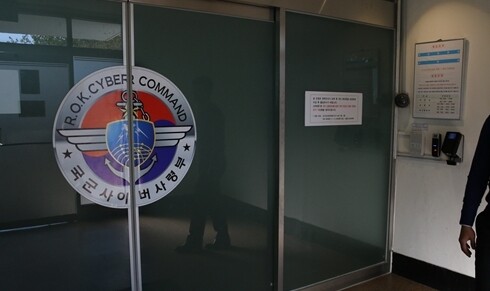hankyoreh
Links to other country sites 다른 나라 사이트 링크
Military Cyber Command to terminate “cyber psychological warfare” operations

South Korea’s Military Cyber Command will be completely ending its “cyber psychological warfare” operations, which created a controversy when it posted political comments online. As a result, the Cyber Command will no longer be posting such comments. The unit will also be renamed the “Cyber Operations Command.”
“We will be moving forward with devising ways to strengthen our cyber security capabilities for national defense, which we have selected as one of the tasks for national defense reform. We are planning to focus on ten major action plans, which include a wholesale reorganization of the Cyber Command’s missions and functions,” the Defense Ministry said in a document issued on Aug. 9.
According to the details of this plan, the Cyber Command will no longer be involved in cyber psychological warfare. The Cyber Command came under fire after news broke about a variety of political comment operations carried out under the guise of cyber psychological warfare, including comments posted in support of then-candidate Park Geun-hye during the 2012 presidential election.
“In cyberspace, it is difficult to identify the enemy. Going too far with cyber psychological warfare is liable to court controversy about political meddling. In the future, we intend to completely preclude the possibility of illegal political involvement,” said an official at the Defense Ministry.
The Defense Ministry is planning to restructure and reinforce the organization so that it can concentrate on its original mission of cyber operations. To begin with, the unit’s name will be changed to the “Cyber Operations Command,” and it will be designated as a “joint unit,” bringing it under the command of the Joint Chiefs of Staff. An “operations center” will be established to strengthen situational awareness and management of cyberspace, while “operations teams” will be assigned to collect information and carry out operations.
“The Cyber Operations Command will become a joint unit that continues to be under the direct authority of the Defense Ministry while also receiving operational commands from the Joint Chiefs of Staff. In regard to the organization, we’re considering the idea of setting up three operations teams, but that isn’t finalized since we’re still working on resetting the unit’s duties, organization and staff,” the Defense Ministry official said.
In order to bolster professionalism in cyber operations, the Defense Ministry is also planning to create a cyberwarfare specialty for commissioned and noncommissioned officers and select qualified service members to be “cyber-soldiers.”
The Defense Ministry is also planning to adjust the number of years that soldiers in the reserves must report for training from four to three after their discharge from the military. This will shrink the reserves in training from 1.3 million to 950,000 while maintaining the total reserves at the current level of 2.75 million. The training stipend will also be increased to 50 percent of the minimum wage, while the 208 reserve training sites scattered around the country will be consolidated to 40 by 2023.
By Park Byong-su, senior staff writer
Please direct comments or questions to [english@hani.co.kr]

Editorial・opinion
![[Column] The state is back — but is it in business? [Column] The state is back — but is it in business?](https://flexible.img.hani.co.kr/flexible/normal/500/300/imgdb/original/2024/0506/8217149564092725.jpg) [Column] The state is back — but is it in business?
[Column] The state is back — but is it in business?![[Column] Life on our Trisolaris [Column] Life on our Trisolaris](https://flexible.img.hani.co.kr/flexible/normal/500/300/imgdb/original/2024/0505/4817148682278544.jpg) [Column] Life on our Trisolaris
[Column] Life on our Trisolaris- [Editorial] Penalties for airing allegations against Korea’s first lady endanger free press
- [Editorial] Yoon must halt procurement of SM-3 interceptor missiles
- [Guest essay] Maybe Korea’s rapid population decline is an opportunity, not a crisis
- [Column] Can Yoon steer diplomacy with Russia, China back on track?
- [Column] Season 2 of special prosecutor probe may be coming to Korea soon
- [Column] Park Geun-hye déjà vu in Yoon Suk-yeol
- [Editorial] New weight of N. Korea’s nuclear threats makes dialogue all the more urgent
- [Guest essay] The real reason Korea’s new right wants to dub Rhee a founding father
Most viewed articles
- 1[Column] Why Korea’s hard right is fated to lose
- 2Amid US-China clash, Korea must remember its failures in the 19th century, advises scholar
- 3[Column] The state is back — but is it in business?
- 4[Column] Life on our Trisolaris
- 5[Guest essay] Maybe Korea’s rapid population decline is an opportunity, not a crisis
- 6AI is catching up with humans at a ‘shocking’ rate
- 7[Column] Can Yoon steer diplomacy with Russia, China back on track?
- 860% of young Koreans see no need to have kids after marriage
- 9[Editorial] Yoon must halt procurement of SM-3 interceptor missiles
- 10OECD upgrades Korea’s growth forecast from 2.2% to 2.6%